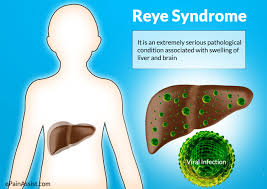Reye’s syndrome ,a rare but very serious complication of common childhood respiratory infections that causes both liver disease and inflammation of the brain (encephalitis).
Causes:
The exact cause of Reye’s syndrome is unknown, but it most commonly affects children and young adults recovering from a viral infection – typically, but not exclusively, a cold, flu or chickenpox.
In most cases, Reye’s syndrome seems to be triggered by using aspirin to treat a viral illness or infection — particularly flu (influenza) and chickenpox — in children and teenagers who have an underlying fatty acid oxidation disorder. Fatty acid oxidation disorders are a group of inherited metabolic disorders in which the body is unable to break down fatty acids because an enzyme is missing or not working properly. A screening test is needed to determine if your child has a fatty acid oxidation disorder.
Symptoms:
The symptoms of Reye’s syndrome usually begin 1-3 days after a viral infection, such as a cold, flu or chickenpox.
Initial symptoms can include:
- vomiting repeatedly
- tiredness and lack of interest or enthusiasm
- rapid breathing
- fits (seizures)
As the condition progresses, the symptoms may get more severe and more wide-ranging, and can include:
- irritability, or irrational or aggressive behavior
- Severe anxiety and confusion that’s sometimes associated with hallucinations
- Coma (loss of consciousness).
Complications:
Most children and teenagers who have Reye’s syndrome survive and some will make a full recovery. However, Reye’s syndrome can leave some people with a degree of permanent brain damage caused by the swelling of their brain. Without proper diagnosis and treatment, Reye’s syndrome can be fatal within a few days.
Long-term difficulties sometimes associated with Reye’s syndrome include:
- poor attention span and memory
- some loss of vision or hearing
- Speech and language difficulties
- Problems with movement and posture
- Difficulty swallowing
- Problems with everyday tasks, such as dressing or using the toilet
If your child develops any long-term problems, an individual care plan will be drawn up to address their needs. The plan will be reassessed as they get older.
🔥81 Views






1 Comment
What is seasonal flu? - NAMAT blog
(November 24, 2018 - 8:06 pm)[…] Over-the-counter decongestants and pain relievers, such as ibuprofen and acetaminophen, may control your symptoms and help you feel better. However, never give aspirin to children. It can increase the risk of a rare but serious condition called Reye’s syndrome . […]